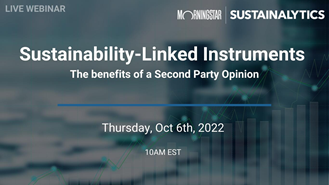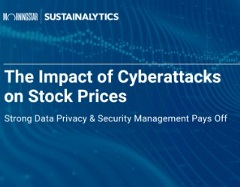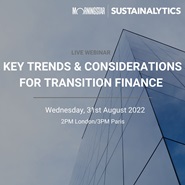UK Stewardship Code 2020 - Stewardship Report
Morningstar Sustainalytics has maintained its status as a signatory of the UK Stewardship Code 2020 (the Code) per the Financial Reporting Council (FRC). Download the report to review how Sustainalytics' commitment to high stewardship standards meets the service provider principles set under the Financial Reporting Council’s revised Code.
The Impact of Cyberattacks on Stock Prices
Data privacy and cybersecurity-related issues have become major drivers of business risk in recent years. Based on Morningstar Sustainalytics’ Data Privacy and Security (DP&S) incident data, this report reviews recent DP&S incident trends and assesses the impact of significant cyberattack Incidents on stock returns over time.
Data Privacy and ESG Risk: 7 Key Questions Every Company Needs to Address
As businesses become more digitized and reliant on personal data, cybersecurity has become a top concern among CEOs and investors. Companies that fail to effectively manage and fund related measures will face a slew of ESG-related challenges and risk.
Climate Change, Innovation, and Cybersecurity in the Defense Industry: New Opportunities for ESG Investors
While perhaps not a widely considered link between the defense industry and climate change, several Eurosatory conference sessions addressed how climate change can intensify security risks and threats.
What’s Happening in Sustainable Finance: Blue Bonds Make Waves, ‘Sleeping’ Sustainability-Linked Loans Raise Eyebrows, and More
In this month’s rundown of sustainable finance market developments, we discuss the outlook for renewables, interesting blue bond transactions and the emerging trend of “sleeping” sustainability-linked loans causing concern among market participants.
The Hidden Costs to Business of Overlooking Data Privacy, Cybersecurity and ESG
As businesses become more digitized and reliant on personal data, cybersecurity has become a top concern among CEOs and investors. Companies that fail to effectively manage and fund related measures will face a slew of ESG-related challenges and risk.
EU Action Planning: ESMA Questions and MiFID Data begs Further SFDR Clarity for Investors
Regulators asking questions about topics central to the EU Action Plan show that more work needs to happen to make this ambitious, first-of-a-kind sustainable finance legislation workable for the market and supervisors and more useful for end investors.
Physical Climate Risks: 6 Things Portfolio Managers Need to Know
The negative physical impacts of climate change are being felt by communities and corporations globally and are likely to get worse in the coming years. The knock-on costs of more frequent “once-in-a-century” climate events on economies are likely to rise. To prepare for this looming threat, investors must forecast the asset-level effects of climate change on companies in a granular and sophisticated way. Here are six things portfolio managers should know to manage and mitigate the physical risks of climate change to their portfolios and meet growing list of climate-focused reporting requirements.
Financing a Sustainable Future: The Evolution of Sustainability-Linked Finance Instruments
The sustainable finance market has seen rapid growth in the last two years, with sustainable debt issuance surpassing US$1.6 trillion in 2021. This blog explores the market trends and future of sustainability-linked loans and sustainability-linked bonds.
Applying Business and Human Rights International Standards to Investor Due Diligence
Socially conscious ESG investors are interested in how to implement international business and human rights norms in their portfolios and understand the potential impacts of applying additional screening criteria within their strategy.
Key Trends & Considerations for Transition Finance
Sustainalytics would like to invite you to our Transition Finance webinar where we will be discussing the development and expectations of Transition Finance, how transition finance has evolved over the past few years, key market considerations, as well as trends, opportunities and challenges. Join us as we discuss what is next on the Sustainable Finance horizon beyond GSSS and Transition Bonds.
What’s Happening in Sustainable Finance: Market Headwinds, GHG Targets in Sustainability-Linked Instruments, the Focus on Supply Chains, and More
In this month’s overview of all things sustainable finance, we look at the shifting global market, ponder the potential impact of the EU green bond standard, and highlight gender-based KPIs in sustainability-linked finance instruments.
Telecom Network Outages, the ESG Risks of a Connected World
The telecom industry is exposed to several Material ESG Issues, including Data Privacy and Security, Business Ethics, Human Capital and Product Governance. Product Governance issues in the telecom industry include service quality, maintaining reliable, high-speed networks, and responding to customer billing concerns.
ESG Risks Affecting Data Centers: Why Water Resource Use Matters to Investors
Data centers play a critical role for many technology and telecom companies and for their supporting servers, digital storage equipment and network infrastructure for data processing and storage. Data centers require high volumes of water directly for cooling purposes and indirectly, through electricity generation. Morningstar Sustainalytics’ recent activation of the Resource Use Material ESG Issue (MEI) within its ESG Risk Ratings recognizes water risks of data centers.
Impact of US Supreme Court’s EPA Ruling on US Utilities’ Carbon Exposure
The Clean Power Plan was created using a directive from the Clean Air Act that enabled the EPA to set emission limits for air pollutants based on the best available technology to reduce emissions. The EPA aimed to cap carbon emissions and curb greenhouse (GHG) emissions by changing the composition of the existing operational power generation assets by forcing the closure of coal plants through strict emission caps, resulting in a system-wide transition to renewable energy.




















